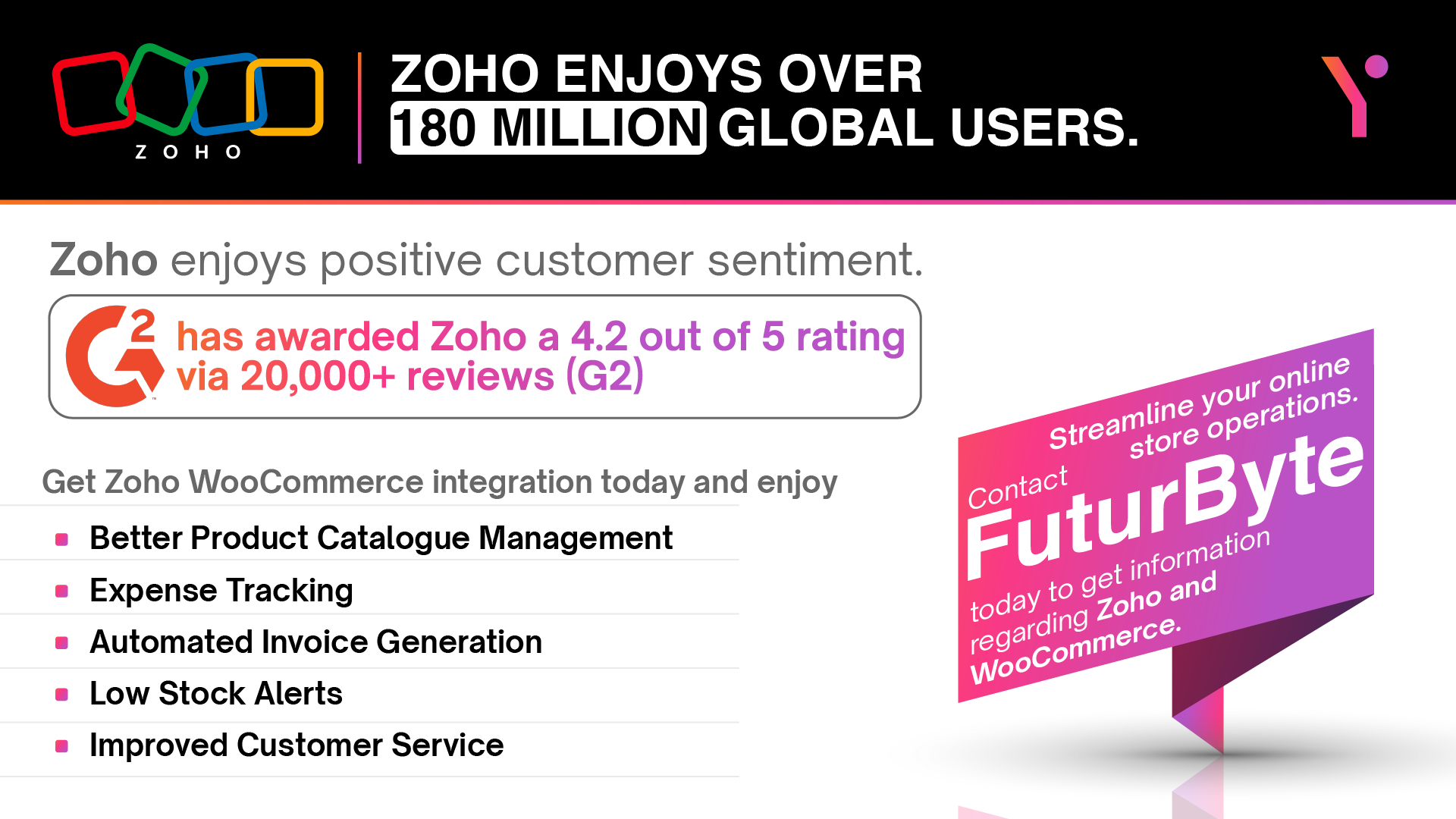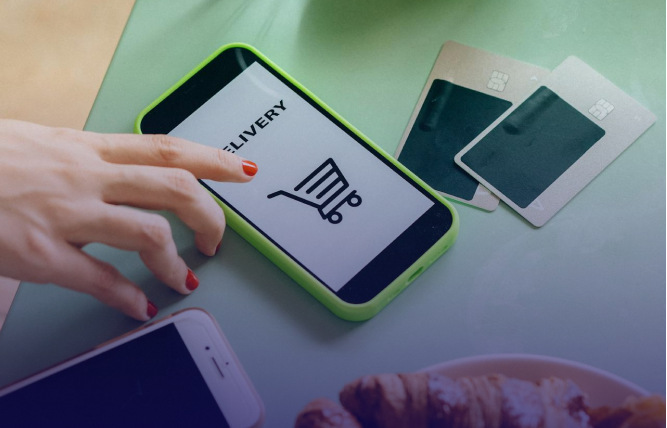Are you finding it difficult to manage your online store? Good news – the Zoho and WooCommerce integration can help you. Keep inventory updated, sync customer data, and generate invoices automatically. Gain insights, save time, and swell your sales.
Operating a successful online store means that you are most likely supposed to juggle several tasks. This includes keeping finances in check, nurturing customer relationships, processing orders, and managing products.
It is true that WooCommerce presents itself as a robust platform that can build your store. However, if you integrate it with Zoho’s business applications, it will effectively streamline the processes and give beneficial insights.
Why Zoho and WooCommerce Integration Matters?
Zoho and WooCommerce Integration matters and is given importance by many of today’s leading WooCommerce website development agencies. Following are some of the benefits you can enjoy with Zoho integration
Automated Workflows
The Zoho Flow lets you automate repetitive tasks, such as sending abandoned cart reminders and making customer accounts in Zoho CRM on new WooCommerce orders.
The result is that you will free your time and emphasise your overall strategic initiatives. Of course, this is great news for any store owner, especially those that are struggling with competition.
Better Financial Control
You have the option of integrating Zoho Books. This will reconcile accounts, track expenses, and automatically generate invoices.
The result is that there is a simplification of accounting tasks and the attainment of valuable insights to improve upon a given business strategy.
Inventory Management
Thanks to the real-time inventory updates throughout platforms, there is the prevention of overselling and the assurance of accurate stock levels. The result is the attainment of a greater degree of customer satisfaction and fewer order fulfilment issues.
Better Customer Management
You can get a highly impressive 360-degree view of your customers. Additionally, you can track interactions, preferences, and purchase history with the Zoho CRM. This will pave the way for personalised marketing campaigns and a better degree of customer service.
Streamlined Operations
Manual data entry between platforms is a very time-consuming activity. This is where Zoho and WooCommerce Integration offers immense assistance as it automatically syncs data throughout WooCommerce and Zoho. The time-saving benefit means that you can now put emphasis on other important duties.
Zoho and WooCommerce Integration: The Benefits

Many companies, such as those that offer WordPress website development or Android app development, have come to acknowledge the following benefits of the Zoho and WooCommerce Integration:
Accounting and Finance
Financial Reporting
With Zoho Books’ reporting tools, you get useful insights into your online store’s performance. You can identify profitable products, analyse sales trends, and make informed financial decisions.
Expense Tracking
Effectively categorise and track your business expenses in Zoho Books. This will give you a very good picture of your financial well-being.
Automated Invoice Generation
One of the many impressive functions of Zoho Books is that it can automatically generate invoices, and this is dependent on WooCommerce orders.
Inventory Management
Efficient Product Catalogue Management
With Zoho, you can manage your product catalogue with high efficiency. This includes images, pricing, and descriptions.
This data is automatically reflected in your WooCommerce store, allowing you to save time and effort.
Low Stock Alerts
You can activate automated alerts in Zoho. The purpose here is to notify you if the inventory goes down a specific level. As a result, you will be able to avoid stockouts and pre-order stock.
Enhanced Product Catalogue Management
You can better manage your product catalogue within Zoho. This includes images, pricing, and descriptions.
All of this data is automatically reflected in your WooCommerce store, saving you effort and time.
Customer Relationship Management (CRM)
Improved Customer Service
You have the option to empower your support team with information-rich customer profiles in Zoho CRM. This will let your team offer a quicker and better-informed service.
Track Purchase History
You can see a full picture of any customer’s purchase history – thanks to Zoho CRM. This means that you can personalise marketing campaigns based on previous preferences and purchasers.
Sync Customer Data
You can erase duplicate entries when you automatically sync customer information between Zoho CRM and WooCommerce.
Integration Options
There are multiple ways in which Zoho and WooCommerce Integration can happen. This depends on your technical expertise and requirements.
Zoho Flow
This is considered to be a very powerful workflow automation that lets you make custom workflows that establish a connection between Zoho applications and WooCommerce.
Understand that this option demands a bit of technical knowledge, but presents the most customisation and flexibility options.
Third-party Plugins
There are a host of third-party plugins that present more extensive integration features, like automated workflows, two-way data sync, and custom field mapping.
Official Zoho Plugins
Many potential Zoho users are glad that it presents official plugins for WooCommerce, which integrates specific applications such as Zoho Campaigns, Zoho Books, and Zoho CRM.
Consider This Before the Zoho and WooCommerce Integration
Let’s say that you are associated with the best ecommerce development company and are looking to make good use of the Zoho and WooCommerce Integration. These are the things that you need to consider on a rather priority note:
Identifying your Needs
You need to analyse which Zoho applications will be best for your online store. Afterwards, select the integration methodology that is best suited to your technical capabilities.
Security
Select a reputable and secure integration solution. Make sure proper data encryption and user authentication are in place.
Data Mapping
Determine the way in which data will be mapped between WooCommerce and Zoho. Ensure that both make use of data formats and consistent terminology to avoid errors.
Important Facts Highlighting Integration Benefits
- More than 40% of businesses have reported enhanced customer satisfaction attained after they implemented a CRM system (Salesforce).
- Automated tasks can save a business at least 30% on operational costs (McKinsey Global Institute).
- Organisations that integrate their eCommerce platforms and CRM witness, on average, a 15% increase in sales. (SuperOffice).
Create a Successful Integration Strategy
The effects of a good Zoho and WooCommerce Integration go well beyond the platform connection. This is why it is always best for you to do the best homework you can with regard to strategy. Here are some vital considerations that will let you maximise the gains:
Humble Beginnings
It will be best for you to avoid integrating all at once. You can begin with the most important functions, such as inventory management and customer data sync. If you have attained a comfortable position with your integration, then you can include more applications and features afterwards.
Data Quality is Paramount
Make sure that there is consistent and accurate data throughout both platforms. You need to regularly cleanse and review your data to maintain data integrity and avoid errors.
Define Responsibility and Ownership
Make sure to assign clear ownership for the integration management. This includes troubleshooting any issues, monitoring data flow, and staying updated on new functionalities and features presented by WooCommerce and Zoho.
Leverage Automation
Make use of Zoho Flow to automate a host of repetitive tasks, such as generating reports, sending abandoned cart reminders, and creating customer accounts. The result will be that you will free your team’s time to better emphasise higher-value tasks.
Training and Support
Offer your team some of the best training on utilising the integrated platform. Guarantee that your customer service representatives properly understand how to access customer data available in Zoho CRM, then make good use of it for quality service.
Take serious consideration regarding ongoing support from the selected integration solution provider for the sake of quality technical assistance.
When you follow the above-mentioned strategies, you stand in a very good position to build an efficient and robust integration. This will then allow you to better manage your online store via superior efficiency, attain valuable customer insights, and also drive business growth.
It is also important to note here that a successful integration should always be considered an ongoing process that demands constant adaptation, optimisation, and monitoring of the ever-changing business requirements.
Concluding Remarks
Throughout this blog, we have looked into a host of benefits, stats, and other information that is related to the Zoho and WooCommerce Integration. Therefore, it is needless to say that this integration offers a great deal of benefit.
For instance, it allows you to streamline your online store operations, optimise your business, and get valuable insights. Naturally, all of these benefits are great for any store that is looking at more than just WooCommerce.
Perhaps you are interested in Shopify and are seeking a good Shopify store builder service. Even in this case, you should take a good look into what Zoho and WooCommerce Integration has to offer. However, make sure that you do good research in this regard.
Finally, if you need more information regarding Zoho and WooCommerce Integration, then contact FuturByte today. They come as a reputed custom website solutions provider that is always looking to assist you with your ZohoWooCommerce integration queries.
Also Read: Hire Someone to build Shopify Store
Frequently Asked Questions
The Zoho WooCommerce integration goes on to centralise inventory details, sales information, and customer data. This will significantly decrease manual entry and errors. Another thing is that it will improve customer relationship management.This will be done by tracking purchase histories and interactions, permitting personalised marketing.When there is automation of workflows such as order processing, it will boost efficiency and save you time. Comprehensive reporting and analytics allow store owners to make data-driven decisions and improve business performance.
Zoho WooCommerce integration usually involves using a plugin or connector. Steps include installing the plugin on WooCommerce, mapping the data field for concise information flow, and configuring the settings to link to Zoho.There are a host of tools (Zoho Flow) or dedicated connectors that can facilitate the stated process. Moreover, the integration guarantees the sync of inventory, products, customers, and orders and requires regular monitoring to keep up seamless operations.
Some of the most prominent challenges in this regard are the potential downtime, mapping discrepancies, and sync issues. The good news here is that these issues can be overcome by thoroughly planning the integration, accurately mapping data fields, ensuring compatibility, and backing up data.Testing post-integration and regular monitoring can assist you in catching these issues early. If possible, then you should try to seek assistance from support teams or integration specialists, as they can offer troubleshooting support and guidance to ensure a smooth transition.
Yes, this is possible. Note that integrating Zoho CRM with WooCommerce improves marketing via personalised campaigns and customer segmentation.Centralised data permits detailed audience segmentation. This leads towards targeted marketing efforts.Note that automated personalised email campaigns can be initiated by customer activity. Here, Zoho’s powerful analytics tools offer insights into a campaign’s performance, thereby assisting in improving ROI and refining strategies.
It is because of this integration that there can be real-time sync of inventory data. This prevents stockouts and overselling.Zoho tools assist in automated reordering and inventory forecasting based on historical sales data.It is because of this integration that you can see a simplification in the management of a host of sales channels via consolidating inventory data into one interface. This will go on to enhance accuracy and efficiency in stock management.
Have questions or feedback?
Get in touch with us and we‘l get back to you and help as soon as we can!




